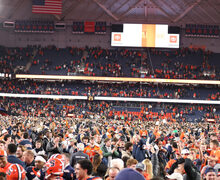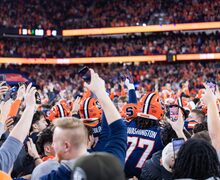Professor keeps 51-year old promise as he waits for NBA Finals outcome
Hannah Wagner | Staff Photographer
Professor David Rubin promised his father he would keep these 1964 Cleveland Browns World Championship ticket stubs in his wallet until Cleveland won another championship.
CLEVELAND, Ohio — A 19-year-old David Rubin made a promise, but he didn’t know he would have to keep it for 51 years.
He was sitting in the lower deck of Cleveland Stadium when the Cleveland Browns thrashed the then Baltimore Colts 27-0 in the 1964 World Championship game, the last time Cleveland won a major sports championship. A game that many Cleveland residents are too young to remember.
After watching the game for a second time with his father on a local TV rerun, Rubin turned to his father and made the now over half-of-a century old promise.
He would keep the championship game ticket stubs in his wallet until the next time a Cleveland sports team won a championship. Rubin, professor and dean emeritus of the S.I. Newhouse School of Public Communications, never thought he would have to keep his promise this long.
So I just said to my father I was going to keep those two ticket stubs, and I would hold onto them until Cleveland won its next championship, which I assumed I would celebrate with him. But, that was ’64, he died in ’79, so we obviously hadn’t done it in 15 years. And I decided since he passed away, I was going to stick to that promise and keep these stubs until we did win a championship. So I am doing it for both of us.David Rubin
Fifty-one years mark the longest championship drought for any city with three or more major league teams. But in 2015, the wait might be over, as a Cleveland team is knocking on the championship door.
The Cleveland Cavaliers are facing off against the Golden State Warriors in the NBA Finals; the Warriors currently lead the series 3-2 with Game 6 to be played Tuesday night.

Hannah Wagner | Staff Photographer
The championship-starved residents of Cleveland are champing at the bit hoping the Cavs can win it all. Many of its residents too young to remember the days of Syracuse University alum and Brown’s running back Jim Brown and the World Championships he brought to the city.
But even Rubin’s memories of the day are fading. He said he remembers being cold and feeling satisfied with the win, but not much else.
It wasn’t unusual. Cleveland won. It wasn’t a distant dream: It was expected.
Now, the Cavaliers are being led by hometown hero, and what some would call the greatest basketball player in the world, LeBron James. The city is so close it can taste it. This could be the year. The drought could end. The tickets stubs could finally come out of the wallet.
But Rubin, who grew up in a Cleveland suburb, isn’t getting his hopes up. He doesn’t like to get wrapped up in the hype because he’s “too old.”
“I have seen too many collapses. I saw José Mesa blow a particular winnable World Series,” Rubin said. “I saw The Drive, I saw the second Drive, I saw The Fumble. I have seen it all. In my heart of hearts I don’t think we are going to win this series.”
Rubin’s feelings mirror those of many Cleveland sports fans. Those who have been disappointed too many times, those who have gotten their hopes up only to be crushed by what has become known as the “Cleveland Curse.”

Frankie Prijatel | Staff Photographer
Outside of the sports world, Cleveland’s struggles as a city are well-known and well documented. Rubin sees the fortunes of both the city and its sports teams as intertwined.
“Well, the fortune of the city has kind of mirrored the fortunes of the sports teams. The city was a very vibrant, wealthy city in the ’40s, ’50s and into the early ’60s, Rubin said. “But then pretty much when the sports teams all collapsed, the city collapsed.”
When the city was ravaged by riots in the late ’60s, residents fled to the suburbs, the Cuyahoga river caught on fire due to pollution and the public school system was collapsing. The manufacturing industry, the very heart of the city, disappeared. Cleveland became the classic Rust Belt city, a shell of what it once was.
John Campanelli, a publisher for Crain’s Cleveland Business and a business reporter for 13-plus years, agreed with Rubin’s parallel. He said the city of Cleveland’s feelings have been negative and depressed over the last several decades both in regard to its sports teams and toward the city in general.
“I think about this a lot. It’s this psyche of Cleveland that we expect bad things,” Campanelli said. “We expect the Cavaliers to lose, we expect our team to get close and fail.”
However, he said, that in 2015 things are looking up for the City of Cleveland. People are moving back downtown because it’s a cheap place to live and a great place to do business, he said. It seems like Clevelander’s attitudes are shifting, and are on an “upward trajectory.”

Frankie Prijatel | Staff Photographer
He said a great example of this shift was an annual report by Destination Cleveland, the city’s tourism arm, that asks Clevelanders if they would recommend tourists visit. This was the first time in many years that more than half of people surveyed would recommend Cleveland as a travel destination.
Campanelli said there is energy in the city surrounding the Cavaliers and the civic future of the city that simply can’t be overstated. For the first time in a long time, there’s hope.
“It would be nice to say that a victory for the Cavaliers would also be a sign of the city’s larger renaissance,” Rubin said. “Certainly, I think LeBron James represents that in that. He came back to not just win a title, but to show that the city of Cleveland and Akron are not as forlorn as people think they are.”
Cleveland is changing as the city is moving toward what residents hope is a more prominent place in the American landscape. As for Rubin’s championship tickets, it’s still uncertain when they will move from its place in his wallet.
Published on June 14, 2015 at 5:36 pm
Contact Jacob: jagedets@syr.edu





